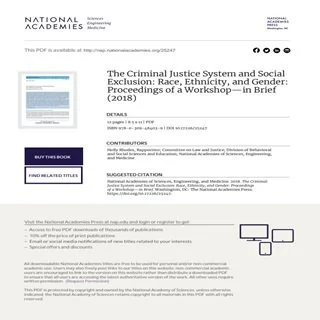By Holly Rhodes
The Committee on Law and Justice of the National Academies of Sciences, Engineering, and Medicine convened a workshop in April 2018 to examine how the criminal justice system affects the fundamental status of people as members of society and to consider next steps for research, practice, and policy for the field. Ruth Peterson (Ohio State University), chair of the workshop planning committee, stated that the goal of the workshop was to find common ground to work toward a criminal justice system that avoids social exclusion through consequences “so severe or lasting as to violate one's fundamental status as a member of society.” Instead, she said, the system should reflect the principles of citizenship and social justice with a “fair distribution of rights, resources and opportunities.” Robert Crutchfield (University of Washington), member of the planning committee, added that the workshop was specifically designed to explore the reasons for the disparate experiences of individuals involved with the criminal justice system by race, ethnicity, and gender, the mechanisms that cause them to persist, and what can be done through policy and practice to minimize those differences. Participants—including researchers, policy makers, and advocates for victims and offenders—discussed issues in five areas: the role of criminal justice in social exclusion; patterns of inequality in criminal justice; collateral sanctions of the criminal justice system; special concerns for youth and young adult populations; and next steps for research, policy, and practice.
National Academies of Sciences, Engineering, and Medicine. 2018. The Criminal Justice System and Social Exclusion: Race, Ethnicity, and Gender: Proceedings of a Workshop—in Brief. Washington, DC: The National Academies Press.


